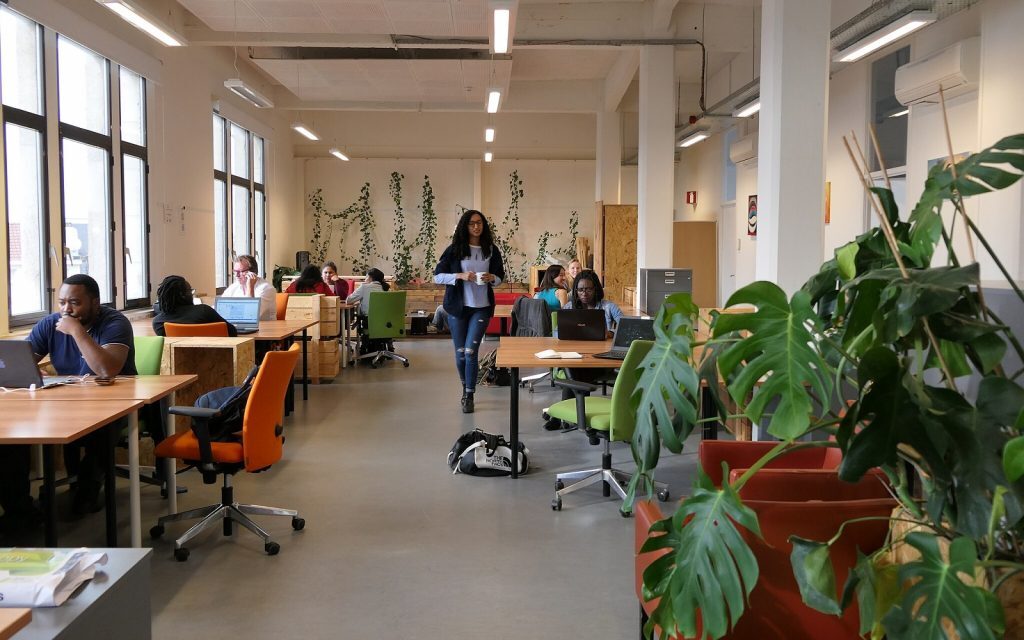Rent is a major expense for many businesses. It’s only natural that businesses would, over time, investigate new ways of working that keep their rent costs down while still meeting their office requirements.
The solution many turned to was the notion of “co-working spaces” – shared working locations (subdivided offices, basically) that offer companies a flexible amount of office space. While co-working spaces appeared as far back as the 1990s, the idea really took off when a little startup called WeWork arrived in 2010, scaled it up, and then expanded globally.
Incidentally, having worked in a WeWork in Jozi prior to COVID, we can say that WeWork’s execution of the idea was excellent, and as such we have fonder memories of working in those offices than of any other location I’ve worked from (possibly because their coffee was amazing and free, two of our favourite things).
Sadly, even then WeWork was experiencing major financial challenges from expanding too aggressively (that costs a boatload of money and is unsustainable for very long, apparently), and the company was taken over from its founder by its biggest investor, SoftBank, in 2019. Those challenges, compounded by the impact of COVID and the collective move to remote work that followed, contributed to WeWork’s further misfortune. Despite some valiant efforts to bounce back, today, their share price is in the toilet. Pity.
Anyway, all that aside, the idea of co-working spaces is alive and well and is experiencing a bit of a resurgence in these post-COVID days.
Co-working spaces…
Co-working spaces are typically large office buildings that are divided into separate office spaces that companies can rent out.
These shared spaces come with everything a modern business needs, from meeting rooms to private cubicles to unlimited WiFi. Everything is included in your (comparatively low) monthly rental, and if you’re very lucky, they’ll even provide access to coffee and tea in break areas.
A lovely side benefit of this approach is that smaller companies can end up sharing space with much larger organisations, and the shared social areas can lead to excellent networking opportunities.
Even if you’re just one person, you can find a spot for yourself in a co-working location for a couple of thousand bucks a month – not bad for a chair and a desk, air conditioning/heating, internet access, a kitchen, coffee and tea, and bathroom facilities.
If you’ve been asking yourself if you should try a co-working space, the answer is a resounding YES.
…and where to find them
So why are we telling you all this? Because this is really just a long segue into the crux of the article: a very handy (and completely UNSPONSORED) introduction to a website called Coworker.com.
Coworker.com is an international site that lists co-working locations close to the location you specify. Punch in Johannesburg, for example, and you’ll get a long list of results telling you where the co-working spaces are located in the city, what they offer, and what their starting prices are.
You can request a quote if you need office space for more than one person, and the co-working location you’re interested in will get back to you. It’s brilliant.
There is a caveat, however: co-working spaces are more common in highly-populated urban centres, so don’t expect to find much (or anything) if you live far from a big city. Try anyway, you might get lucky.
There you have it
For the right size business, using a co-working space is a no-brainer.
Co-working spaces are cheaper than traditional office space, have a ton of benefits, and you’ll likely have the opportunity to rub elbows with a wide range of business types while you go about your daily business.
And who knows, you could find the right people to collaborate with on The Next Big Thing for your company while you’re there.
Go on, give it a try.
The header image is licensed under the Creative Commons Attribution-Share Alike 4.0 International license.




